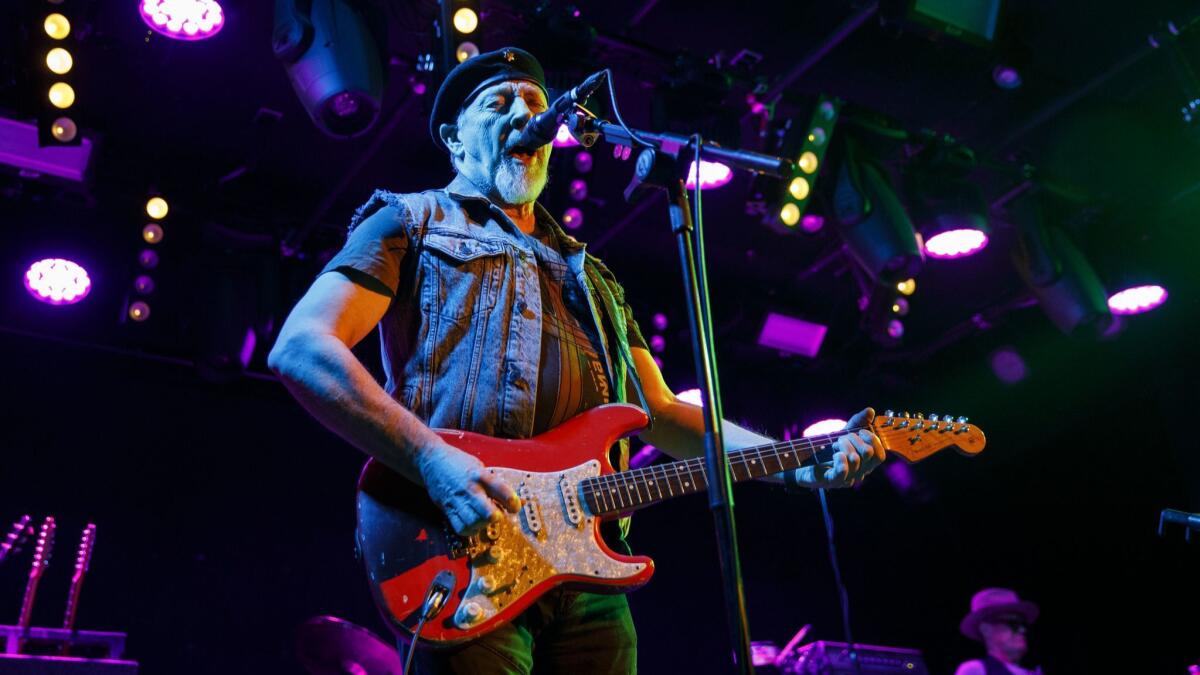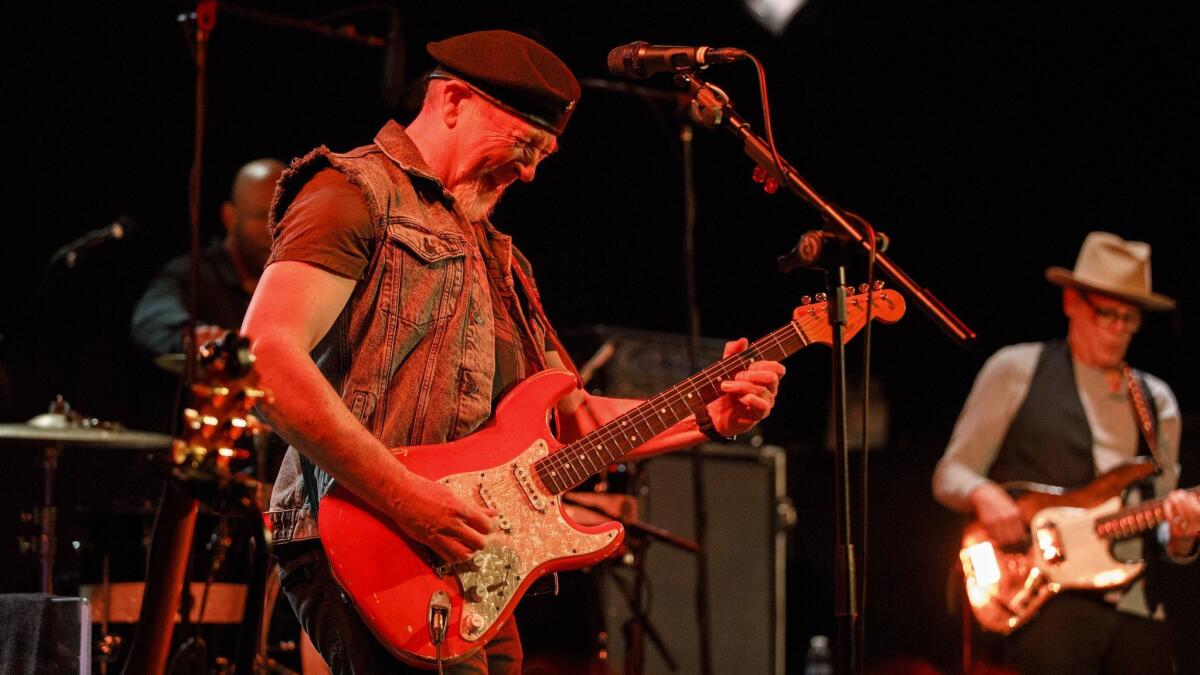Review: Guitarist Richard Thompson schools the crowd — no brags, boasts or egotism necessary

- Share via
Singer, songwriter and master guitarist Richard Thompson set the tone for his Tuesday show at the Teragram Ballroom with the night’s first lyric. “What’s my name? My name is Trouble,” Thompson sang by way of introduction to open “Bones of Gilead.” His band, dubbed the Electric Trio but expanded at times to a quartet, supported him with Bo Diddley-ish rhythms that popped into place like a high-rise ascending in time lapse.
Embodying the voice of the biblical prophet Micah, the Fairport Convention co-founder, who helped introduce British folk rock to America starting in the late 1960s, warned in his opening song of false prophets, heartbreak, ruins and rubble.
Over the next 90 minutes Thompson pondered various woes and dilemmas; he wove in strands of hope and love while bending various electric and acoustic guitars to his will. He bemoaned “little tears of yearning” here, a beating heart so powerful that “no rib cage can hold” it and “vandals pissing” in dying neighborhoods there. He outlined concerns both external and internal.
“The nerve of some people,” Thompson, 69, sang with exasperation on “Can’t Win.” On “The Rattle Within,” he meditated on “that wandering deep inside you” — existential dread, regret, fear, whatever — before asking aloud, “Who’s gonna save you from the rattle within?”
Touring in support of his riveting recent album, “13 Rivers,” Thompson and band hummed through songs from across his career. The first of two nights at the club, he played to an adoring capacity crowd, many of whom followed his fingers along the fret-board with a kind of religious fervor.
That stands to reason, because there’s nothing like a Thompson guitar line, to say nothing of his solos. After half a century as a professional guitarist, he’s at one with his instrument. During a three-minute solo during “Can’t Win,” the guitarist zipped and ripped, the tendons in his hands moving like bike spokes on a downhill ride, maneuvering along a clear, smooth-as-glass pathway that connects his fingers and muse.
Equally impressive was the economy of his technique. Even during his brilliantly weird bridges and four-bar diversions, he dotted measures with microscopic precision. At times his digits barely seemed to move, but from those minuscule shifts rang musical ideas as vast as the cosmos. When he concluded his flights, the band (Michael Jerome on drums, Taras Prodaniuk on bass and Bobby Eichorn on guitar) drove toward codas, and a furrow-browed Thompson swapped out guitars. No brags, boasts or egotism necessary.

At the Teragram Thompson shone as a balladeer, as well. Dusting off a lesser known acoustic song called “They Tore the Hippodrome Down,” he laid out a finger-picked melody while a past-his-prime narrator bemoaned his lot — “living on memories, existing, that’s all.” Prompted by the demolition of a dance hall he frequented as a kid, the artist sang of nostalgia, carefree youth and the passage of time. “Now my youth’s a hole in the ground / I hardly know the streets of my own town / They tore the hippodrome down.”
For his ode to a classic motorcycle, “1952 Vincent Black Lightning,” the songwriter spun a tale about a love affair, a machine, a shotgun blast and a dying wish. On “Wall of Death,” the great song from his collaboration with former wife Linda Thompson, he employed fairground attractions — a carousel, a tunnel of love, a “crooked house” — in service of a song that celebrates the thrills that come “closest to being alive — let me take my chances on the Wall of Death.” He then hijacked his guitar for a roller coaster of a solo.
Unlike more lauded ax-wielding Brits of a certain era, Thompson has shown little interest in pyrotechnics. He’d rather tune a guitar than smash one, doesn’t mimic Chicago blues players, wouldn’t be caught dead drawing a violin bow across his Fender and has viewed distortion with suspicion. This lack of showmanship is perhaps one reason why, unlike Eric Clapton, Pete Townshend or Jimmy Page, Thompson has never been fully embraced by the mainstream American rock crowd.
Thankfully, Thompson’s work has endured, and the longtime Angeleno has built a big enough base to make a living of it.
That level of success was hardly assured. The artist told The Times in 1985 that he still had a ways to go in the States. “The audience has to grow a little ... just to make it economically feasible,” he said, adding that so far he’d lost money touring America.
“If I can get to the point of breaking even or earning a bit, then there really isn’t a problem from there on,” he concluded. All these decades later, the crowd at the Teragram confirmed that the problem has been solved — even if the trouble remains.
For tips, records, snapshots and stories on Los Angeles music culture, follow Randall Roberts on Twitter and Instagram: @liledit. Email: [email protected].
More to Read
The biggest entertainment stories
Get our big stories about Hollywood, film, television, music, arts, culture and more right in your inbox as soon as they publish.
You may occasionally receive promotional content from the Los Angeles Times.











